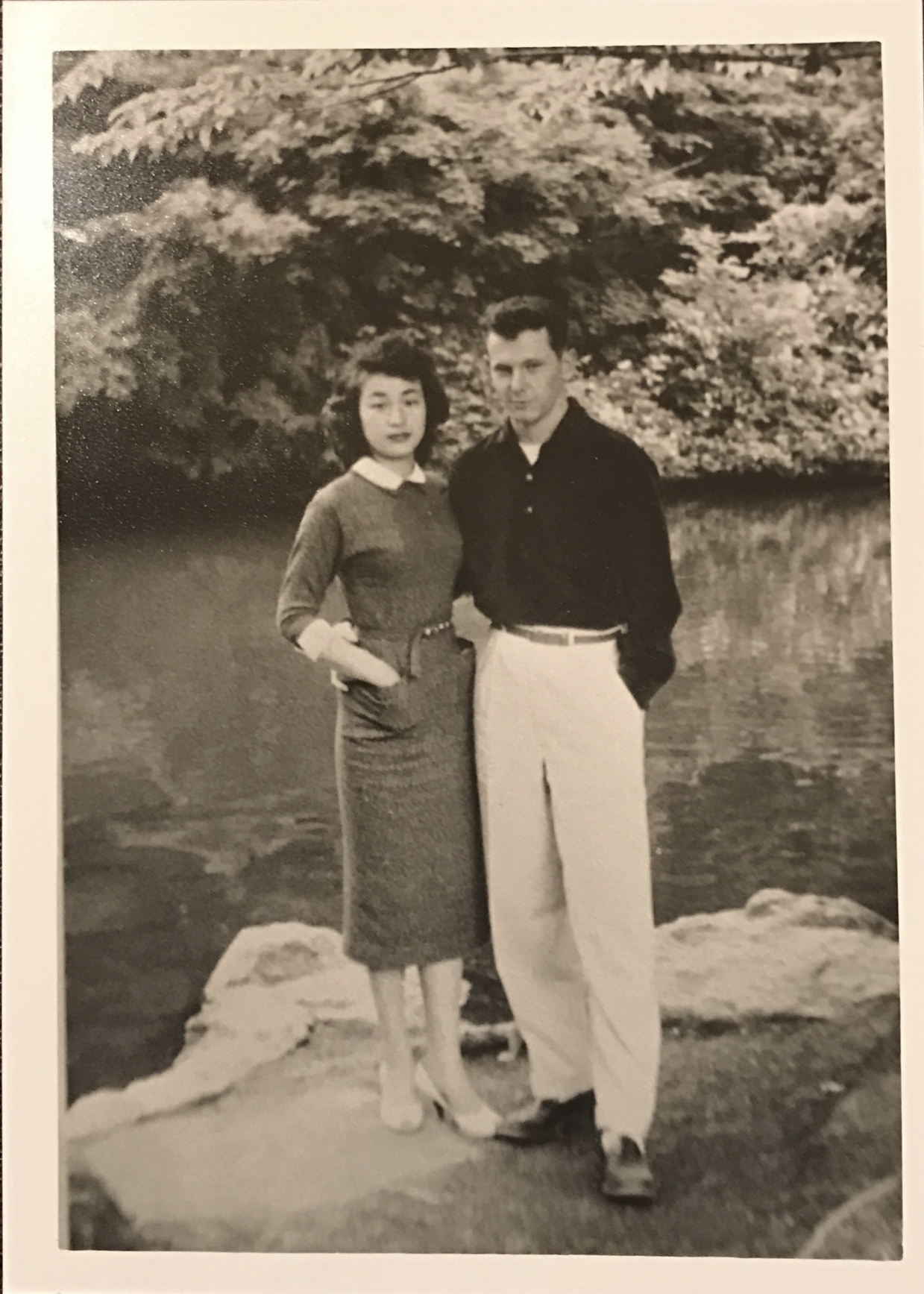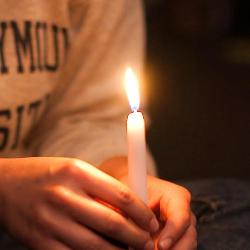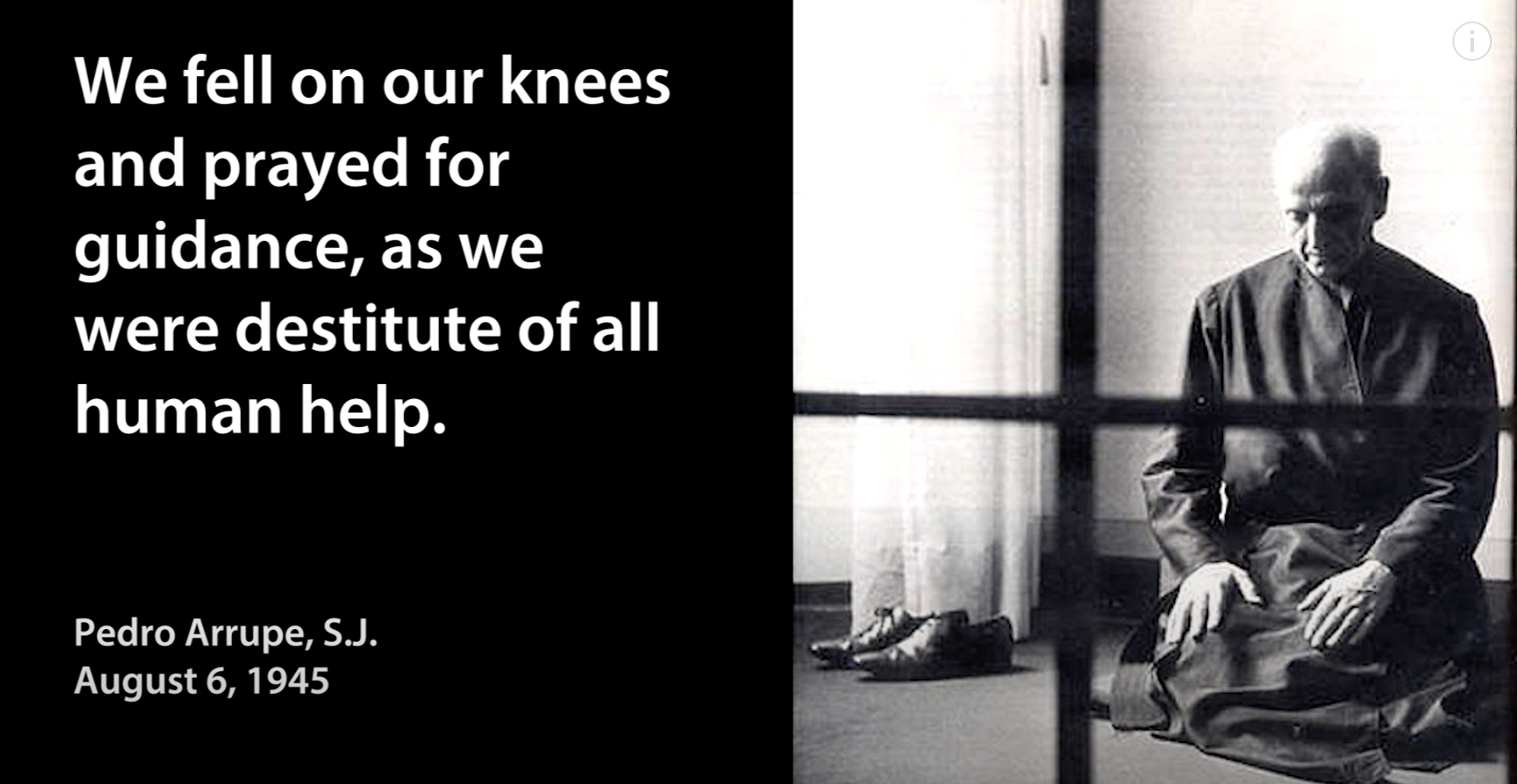
Ruins of Nagasaki (Yosuke Yamahata, 1945)
Tuesday, August 11: Remembering Hiroshima and Nagasaki
This month, August 2020, marks 75 years since the atomic bombings of Hiroshima (August 6) and Nagasaki (August 9), Japan during World War II. John Flaherty, Associate Director of Campus Ministry and Director of Liturgy and Music, reflects on his family connection to the Nagasaki bombing and prays for peace, justice, and the laying down of weapons everywhere.
✜
August 9, 2020
If we are friends, you are one degree of separation from someone affected by the atomic weapon that was unleashed on humankind 75 years on this day.
I often think about the fact that Fr. Pedro Arrupe, S.J., who was the Jesuit Novice Master at the Novitiate in Hiroshima, lived only 150 short miles away from my mother’s village in August 1945. How small the world is.

For reasons unknown to me, this anniversary of the bombing of Nagasaki has been haunting me for weeks now. Perhaps, it’s because my parents went home to God three short years ago. Perhaps it’s because I know that, at this point in life, I’ve lived more days than I haven’t. Perhaps, it has something to do with my life-long stance as a pacifist having heard my mother’s stories of the second great war to end all wars. And perhaps, it is because I’ve come to learn in recent years that my mother and her family, having suffered radiation poisoning and several different forms of cancers since the late 1940’s, were victims of the atomic bomb that fell on Nagasaki 75 years ago on this day.
I’ve never written or spoken much about the following with anyone other than my parents and Kathy, my wife. I suppose my family’s experiences are similar to others in that there are, at times, those memories that are just too painful to remember over and again.
My mother, Sachiko, which means happiness, was an impoverished and malnourished Japanese girl of 11. Her family lived less than 40 miles west from Nagasaki in Kumamoto prefecture. In the early morning of August 9, 1945, the wind in Nagasaki had shifted from easterly to westerly, in the direction of Kumamoto. My mother never spoke much about the day the bomb fell, but she told me countless stories of being strafed by fighter planes and bombed as a child. The radiation poisoning from that horrific day affected her, her family and me.
Please God, let monsters the likes of Hideki and Adolf who dragged Japan and Germany into a war built on the backs of poor civilians never be known again. May nuclear weapons never be loosed on humanity and this fragile world ever again. May the day come when mothers and fathers of all nations never have to send their sons and daughters to fight in wars only to outlive and have to lay them to rest. May that day come when God’s peace reigns in this world and may the angry weapons of war, nuclear and otherwise, never rain down fire on humanity ever again.
Al Anzack’s words come to mind and I know my family’s experience is not uncommon:
Of none of these things are the family's feelings known. They are things not spoken of but recognized in each other's eyes, written only in the human heart where the intimacies of a family history are kept and perhaps treasured for telling to a future generation.
✜
John Flaherty has been involved in music and educational ministry for 40 years as an educator, elementary school principal, music director, liturgy director, and composer. He developed and is the primary instructor of the Pastoral Liturgy and Pastoral Music Certification Programs in LMU’s Center for Religion and Spirituality from which over 175 parish and diocesan liturgy and music directors have graduated. John has served as the Chairperson of the Liturgy Committee and Music Director for the Los Angeles Religious Education Congress, the largest annual catechetical and liturgical conference in the world, since 1991. John has been married to his wife, Kathleen, for 33 years and they have five children, all of whom are LMU Lions.
Pedro Arrupe and the Atomic Bomb
In 1945, Fr. Pedro Arrupe, SJ was serving as novice master for a community of Jesuits on the outskirts of Hiroshima, Japan. On August 6, U.S. forces detonated a nuclear weapon over the city, and Arrupe and his fellow Jesuits witnessed the immediate aftermath of death, destruction, and injury. The chapel of the novitiate was used as a temporary hospital for the wounded, and Arrupe used his medical training from before entering the Jesuits to assist with their care. Later, as the Superior General of the Society of Jesus (1965–83), Arrupe became known as a "second founder" of the Society and a powerful advocate for a faith that does justice and the preferential option for the poor and vulnerable.
"Pedro Arrupe's Hiroshima diary" (America Media)
More Resources on War, Peace, and the Anniversary of the Bombings
- War and Peace from the United States Conference of Catholic Bishops
- Prayer card for the 75th anniversary of the bombings of Hiroshima and Nagasaki
- War and Peace from the Ignatian Solidarity Network
-
"'The Risk of the Cross' reckons with our nuclear danger" (National Catholic Reporter)


